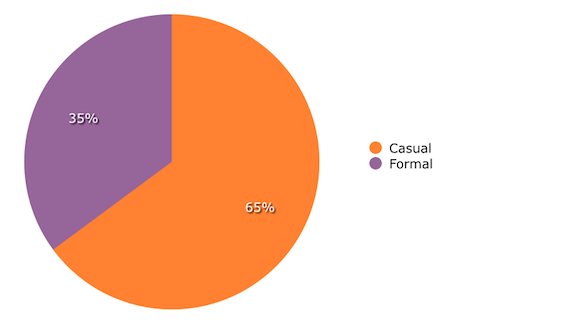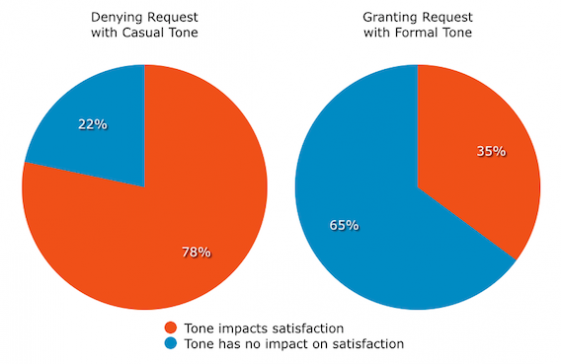According to Help Scout, 94% of all online retailers provide email customer service. That means that a significant number of interactions with customers are made through email. Software Advice, a website that rates customer service software, released some interesting findings in a survey this summer on the best ‘tone’ for email customer support.
So, how do we train customer support agents to speak in a tone that customers prefer without negatively impacting the customer’s experience or our business? First we need to understand our customers’ preferences.
First our agents must speak to our customers in the tone they would prefer. Based on the survey we now know that customers generally prefer a casual tone. In fact, 65% said they prefer a casual tone while only 35% said they preferred a formal tone.
Of course, there is a fine line to consider when conversing with customers via email.
We must take into consideration the nature of the correspondence and what the customer’s emotional state is. The appropriate tone is context dependent.

Most customers prefer a casual tone, except when they don’t.
Customer support teams often use preformed responses in corresponding with customers. It allows the support agent to be more efficient and to remain consistent with the company’s approach. However, preformed responses tend to have a single, usually formal, tone. Support agents need to determine what tone is appropriate based on the topic and the emotional state (as much as can be determined) of the customer.
The CSI survey also showed that users are sensitive to tone dependent on the nature of the correspondence.

The survey showed 78% of customers said that when an agent used a casual tone when denying a request, it would have at least some negative impact on their customer satisfaction. While, 35% of customers said that when an agent used a formal tone when granting a request it would have a bothersome impact on their customer satisfaction.

This means, agents must be cautious of using preformed responses in a way that seems canned or unnatural to customers and that responses should be tailored to the situation in tone as well as content. In general, teach your reps to keep it light when delivering good news. Conversely, teach them to be sensitive and more formal when the customer’s request can not be met.
The survey also delved into some of the specifics of communication and found the following:
___
Email is still one of the most important customer service and communication channels, and it is a channel that strips away many of the basic modes of communication — tone of voice, body language, and facial expressions — that human beings use to convey meaning. It is essential that customer support agents are aware of the tone the customer prefers and to apply that tone on a customer by customer basis.
Of course, one of the great challenges of customer service has always been that customers are not the same, and the data above shows that the tone that may work for one customer will be unwelcome by another.
To be successful, service reps must learn the differences between formal and casual email tones and learn to sense when one is needed over the other.
Have you ever had a support rep use a tone through email that seemed inappropriate to the situation?
© 2011-2025 CTS Service Solutions, LLC.
All rights reserved.
Legal Information | Privacy Policy
How to Cite this Site